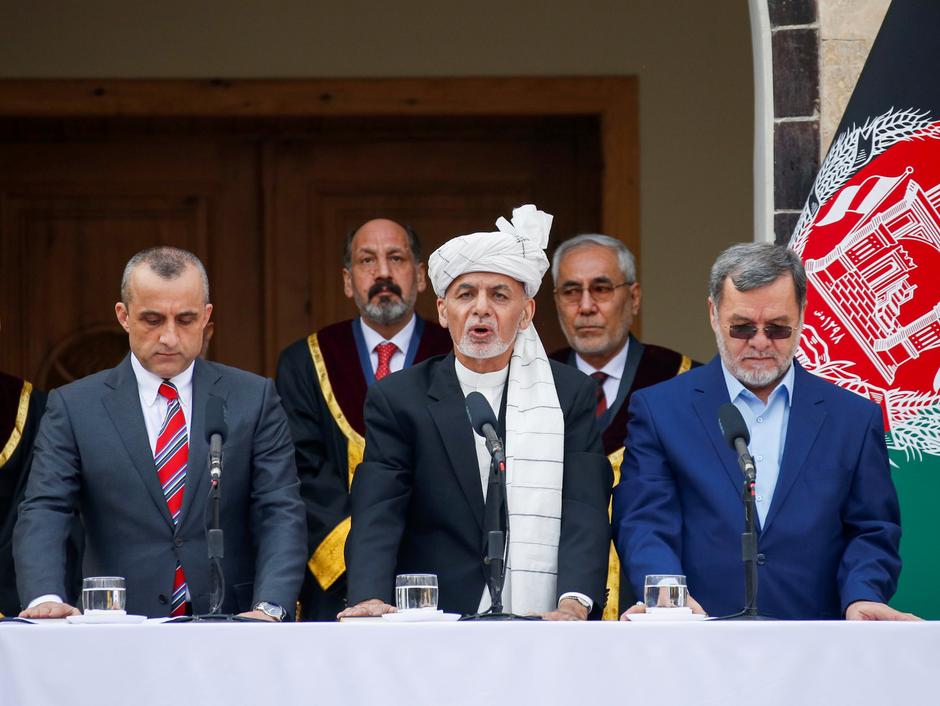Afghan political stability a must during this critical period
https://arab.news/vbxjy

As typical of Afghanistan’s political dynamics and as widely predicted, the 2019 presidential election’s results were not announced until February after five months of delay by the Independent Election Commission (IEC) due to disputes over alleged irregularities in the electoral process. The IEC declared President Ashraf Ghani as the winner for a second term. However, Abdullah Abdullah, the main challenger, claimed a parallel victory for himself, accusing the IEC of favoring Ghani and failing to address his grievances. Despite Abdullah’s claim, the IEC’s announcement was widely accepted by Afghans as a legitimate declaration by the authorized institution of the state.
Even after the announcement, Abdullah remained obstinate. He consistently raised his voice nationally and internationally that the victory announcement for Ghani was not credible and that the result should be declared void. However, he left the door open for negotiations over a potential power-sharing formula. Abdullah was, in fact, seeking a similar national unity government to that of 2014, which was brokered by then-US Secretary of State John Kerry and gave Abdullah the position of chief executive and the authority to choose almost half of the government’s key appointments.
Soon after the EIC’s February declaration, Ghani announced that he would take the oath of office at an inauguration ceremony. Abdullah threatened to hold a parallel inauguration ceremony, declaring his own government, if Ghani went ahead with his plan. There were some last-minute efforts by US Secretary of State Mike Pompeo and peace envoy Zalmay Khalilzad to broker some kind of deal between Ghani and Abdullah. However, these efforts failed and the two sides were unable to reach a deal.
March 9, 2020, was then recorded as a day of national disgrace in Afghanistan’s history, with Ghani and Abdullah holding two parallel inauguration ceremonies. The two venues were only separated by a wall, with the Arg (the presidential palace) on one side and the Sapedar Palace (the chief executive’s palace) on the other. Ghani’s swearing-in ceremony was attended by a large number of national figures and international dignitaries, including ambassadors and the representatives of various foreign missions. This, however, did not include representatives from Russia and Iran. Meanwhile, Abdullah’s ceremony was mainly attended by the leaders of his own coalition and their supporters.
It is not just the legal credibility of a government that matters in a politically divided state like Afghanistan — the political legitimacy is equally important for stability and national unity.
The Afghan government has already faced political and economic repercussions as a result of Ghani and Abdullah not being able to resolve their differences and reach an agreement for an inclusive government. In this regard, the US has already announced a $1 billion cut in aid for Afghanistan. Although Ghani may not be under any legal obligation to form an inclusive government, politically it seems impossible to ignore as national and international pressures mount.
Although Ghani may not be under any legal obligation to form an inclusive government, politically it seems impossible to ignore.
Ajmal Shams
Negotiations, mainly mediated by former President Hamid Karzai, have already been initiated in an effort to persuade the leaders to come to an agreement that will lead to the accommodation of Abdullah and his team within the administration led by Ghani. The latter has already offered Abdullah the chance to lead the Supreme National Reconciliation Council, with all required protocols, and to include some of his team members in the Cabinet. However, media reports suggest that Abdullah’s demands may be far greater than what has been offered so far.
Afghanistan is currently passing through a very critical period. The country cannot afford political instability during these difficult times. On the one hand, the coronavirus pandemic has spread to almost every corner of the country and, on the other, violence continues and there has been no progress on peace negotiations with the Taliban. During these times of political and economic woe, it is important for the political leaders to set aside their differences in the best interests of the nation and unite to address the pandemic, as well as prepare for intra-Afghan dialogue through national consensus.
- Ajmal Shams, based in Kabul, is president of the Afghanistan Social Democratic Party. He was a deputy minister in the national unity government, and served as policy adviser to Ashraf Ghani before his presidential bid. Twitter: @ajmshams









































